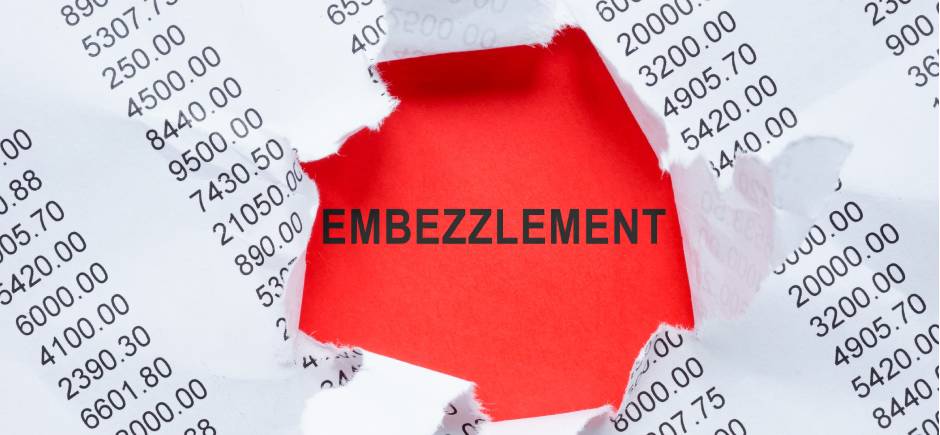Antitrust laws were established to protect trade and commerce from abusive practices. Violations can include price-fixing, price discrimination, restraints, and monopolization.
Miami Embezzlement Lawyer
Miami Embezzlement Attorney

Embezzlement charges are white-collar crimes where a person with fiduciary responsibility in a business or organization is accused of unlawfully stealing funds from that business or organization for their benefit. Depending on whether the charges are brought in federal or state court and the total amount of loss that occurred, you could face as little as time served or as much as up to 30 years in prison.
You may also be placed on probation and must pay restitution and attorney’s fees for the victim’s business or organization.
If you are under investigation or have been arrested for embezzlement in Miami, you must consult a qualified, dedicated South Florida white-collar attorney to discuss your legal options. Call Kirlew Law Firm at 305-521-0484 today to take that first step toward your freedom.

What is Embezzlement?
Embezzlement occurs when an individual (often an employee) wrongfully takes money or property that someone entrusted to them for safekeeping. For example, you may have been entrusted with your company’s funds to pay for payroll, inventory, or operating costs, but instead of purchasing the items, you use the money for personal expenses.
The way something is stolen is a critical element of an embezzlement charge, even if it is visible or in the owner’s presence. For example, it is possible that an employer won’t know if there is any money missing if they are not keeping track. This is especially common in businesses where multiple employees have access to funds. It is still illegal in Florida to spend money without prior authorization despite having legal access.
Penalties for Embezzlement in South Florida
In Federal court, embezzlement charges are primarily charged in 18 U.S. Code § 641, 642, and 643. An embezzlement conviction can result in imprisonment of up to ten years. In federal court, embezzlement charges are rarely charged alone. It is usually part of a greater conspiracy, including charges of racketeering and wire fraud. Federal cases involve much more significant amounts of funds stolen, and that loss amount will dictate the length of incarceration a person faces in federal court.
In Florida state court, embezzlement charges in Florida are primarily based on F.S. § 812.014 (or theft statutes). And like theft, the punishment varies based on the severity of what has been stolen.
Embezzlement can be charged as either a misdemeanor or a felony depending on the items taken, their value, and whether the accused has prior embezzlement convictions:
- Embezzlement of property or money valued less than $100 can result in a second-degree misdemeanor charge of petit theft, punishable by up to 60 days in jail and/or up to $500 in fines.
- Embezzlement of property or money valued between $100 and $1000 is a first-degree misdemeanor, punishable by up to 364 days in jail and/or up to $500 in fines.
An individual who misappropriates items valued at over $1000 or has a previous conviction for embezzlement may be charged with a felony.
- Embezzlement of less than $20,000 worth of property constitutes a third-degree felony punishable by a maximum of five years in jail, five years probation, and up to $5,000 in fines.
- Embezzlement of property valued at $20,000 or more but less than $100,000 is considered a second-degree felony, punishable by a maximum of fifteen years in jail, fifteen years probation, and/or up to $10,000 in fines.
- If a person has embezzled property worth $100,000 or greater, they may be charged with a first-degree felony. These crimes carry punishments of up to thirty years in prison, thirty years of probation, and/or up to $10,000 in fines.
In addition to the property value, other circumstances, such as an emergency, can obscure the definitions of the different embezzlement charges and result in a greater charge. For clarity, schedule a consultation with a Miami white-collar attorney like Brian Kirlew, Esq.
Act Quickly to Defend Your Rights — Contact the Kirlew Law Firm NOW!
If you are convicted of embezzlement, it will stay on your record, and prospective employers will know about it. Most people who are charged with embezzlement work in a job or area where they are in a position of trust, so if they are convicted, their standing in the community and the opportunities for future employment will be affected. Under the substitute assets theory, the government can also seize funds directly derived from embezzlement or even go after assets not connected to the embezzlement.
Make sure you give yourself a fighting chance — contact the Kirlew Law Firm to get one of South Florida’s best white-collar attorneys on your side. Our mission is to protect your rights and secure a favorable outcome so your life can get back on track. Our team at the Kirlew Law Firm will work closely with you to build a strong defense strategy for your case. Call (305) 521-0484 or contact us online for a free case evaluation.
Contact a Miami White Collar Criminal Attorney today!
If you are being investigated for a White Collar crime at the state or federal level (or both), the sooner you get a qualified attorney on your side to protect your rights, the better. Brian Kirlew, Esq. is experienced and skilled at handling these complex and sensitive matters, and is here to represent you in court. Our criminal defense attorneys in Miami are proud to offer you a free phone consultation to ensure that we can best serve you. Contact us immediately to get started.

